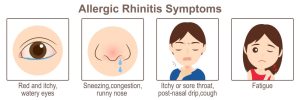Allergic Rhinitis
Allergic rhinitis is a type of inflammation affecting the nose that occurs when the immune system overreacts to allergens in the air. Nasal signs and symptoms include a stuffy or runny nose and sneezing. Ocular symptoms include red, itchy, and watery eyes, and sometimes swelling around the eyes.
This condition occurs when the body’s immune system over-responds to specific, non-infectious particles such as plant pollens, molds, dust mites, animal hair, industrial chemicals (including tobacco smoke), foods, medicines, and insect venom. Essentially, during an allergic attack, antibodies, primarily immunoglobin E (IgE), attach to mast cells in the lungs, skin, and mucous membranes. Once IgE connects with the mast cells, a number of chemicals are released. One of the chemicals, histamine, opens the blood vessels and causes skin redness and swollen membranes. When this occurs in the nose, sneezing, drainage, and congestion are the result.
Symptoms of allergic rhinitis

- Red and itchy, watery eyes
- Sneezing, congestion, runny nose
- Itchy or sore throat, post-nasal drip, cough
- Fatigue
Diagnosis and Treatment
Dr. Weiss is specially trained in the diagnosis and treatment of allergic rhinitis in both adults and children. Diagnosis is key to treatment. During your consultation Dr. Weiss will thoroughly examine your ears, nose and throat and ask you detailed questions regarding your symptoms. Allergy skin testing can be performed in the office when indicated. Dr. Weiss also utilizes ImmunoCAP® blood testing for allergies to environmental pollens and foods.
Corpus Christi ENT Sinus & Allergy can treat your allergic rhinitis in several ways. These include oral medications such as antihistamines, antileukotrienes, and decongestants. Topical medical treatments include nasal steroids, nasal antihistamines, and eye drops. Immunotherapy (allergy shots) or sublingual immunotherapy is another common management option that we offer. Once allergy testing has been performed, avoidance of known allergens can also be utilized for treatment, especially in cases of food allergy.